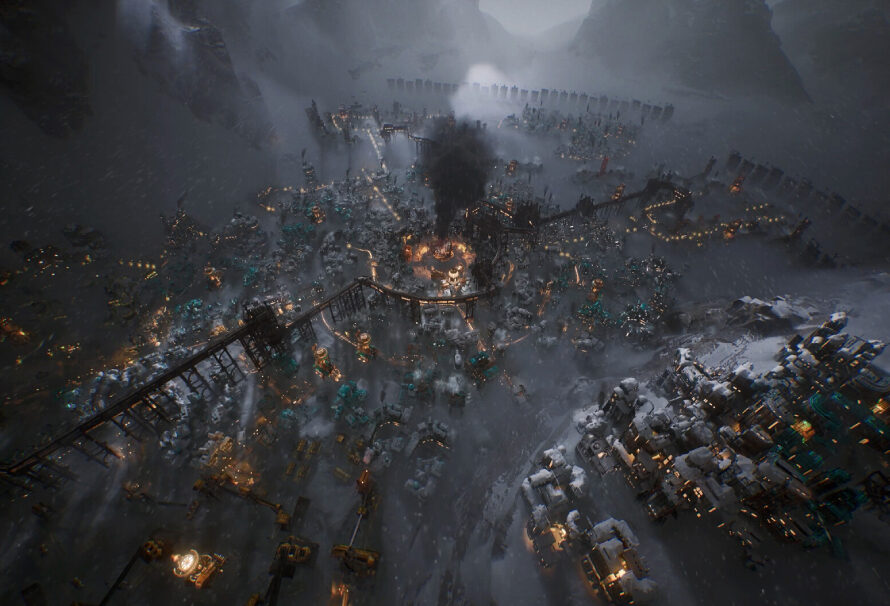It was probably after desperately stealing some medication from someone’s ailing grandfather in 2014’s This War Of Mine, that I realised developer 11 Bit Studios had a real grasp of brutalist tactics and more pointedly, a handle on making the player twist their moral compass in the name of survival. There was nothing quite like it in 2014 and with the release of Frostpunk in 2018, that particularly gut-punching school of game design was given a much broader sweep and scale, tasking armchair leaders with taking care of an entire city locked in the midst of a climate apocalypse.
Some six years later, Frostpunk 2 seeks to bring back the series’ focus on brutalist strategy as it once more calls upon players to shepherd a population of desperate survivors towards the goal of their ultimate survival, all the while dealing with both external and internal pressures that relentlessly seek to imperil their very existence. That said, Frostpunk 2 does all of this against a somewhat different backdrop.

In Frostpunk 2 players assume the role of the Steward, an overseer of the interconnected city districts of New London and it’s a vocation that on the surface seems similar to the roles and responsibilities the player had in the first game. However, whereas the first Frostpunk title was very much a grim, survivalist nightmare with little hope for a better future, Frostpunk 2 instead shows us a world where prosperity can be attained, despite human nature. Certainly, much like its predecessor and other post-apocalyptic yarns, Frostpunk 2 keenly understands that the biggest threat to humanity is, you guessed it, humanity itself and so the sequel largely runs with this notion as its core message throughout.
As one might expect then, moral conundrums come thick and fast and in a world where just about everything that could go wrong does go wrong, and usually rather incredibly badly, Frostpunk 2 forces players to choose between awful and less awful outcomes regularly. For example, with a sizable younger workforce, you can pull them out of your child shelters (assuming you set them up in the first place) and send them down to work in your newly fashioned, but somewhat unsafe, Advanced Coal Mine. What do you do, however, when you discover that the mine has experienced a fault which could lock the young folks inside, effectively killing them, yet all the while their doomed toil results in key ore being processed to keep the lights on in your city?
Very much dovetailing into the idea of civilization progression that Frostpunk 2 is presenting is the biggest functional difference that 11 Bit Studio’s ambitious sequel brings over its predecessor, the Council. A conclave of various represented factions that each have their own skin in the game and which must provide you with a majority vote (out of 100) on whichever laws you attempt to create and pass, the Council is a central and very much macro part of Frostpunk 2’s brutalist strategy gameplay.

With outsized egos, odious politics and religious beliefs representing the array of factors that can influence decision-making in the Council, Frostpunk 2 ensures players aren’t just concerned with resource hunting and moral decisions but are also focused on chasing votes and appeasing factions to get what they want. Need to pass a law for increased technological innovation to improve crop yield for the sparse months ahead? Sure, such a law might make the technologically-obsessed Engineer faction happy, by the same token it’s likely to annoy the Foragers who shun such advances and instead believe in the natural bounty of the land. This can subsequently lead to conflict on other issues at a later date. Of course, if you’re feeling especially dictatorial, you may simply declare a state of emergency and bring a brutal crackdown on those who oppose you, splintering friends and family through violence and ensuring your political opponents know that you really aren’t someone to be messed with.
There are no good choices in Frostpunk 2, just marginally less terrible ones that still leave you with a gaping, all-consuming vacuum of utter blackness where your heart used to be. More so than the first game ever did, Frostpunk 2’s embrace of brutalist political strategies and myopic attitudes raise an uncomfortable mirror to the real world itself. Certainly, a glut of hastily made and panic-stricken decisions will affect those the worst-off in society the most, while the more affluent and capable find themselves largely insulated from the consequences of such choices.

Lest New London ends up an omnishambles of colossal proportions then, Frostpunk 2 invites players to attempt to strike some sort of balance that sees them keeping at bay the critical crises that threaten the city in its near term, while balancing the probability and risk of longer term crises and how they might unfurl further down the road.
You will never make everyone happy and it would be folly to try and do so, and yet, Frostpunk 2 asks the player to maintain a careful balancing act of the various factions in place via its new Council system. To that end, don’t be surprised if Frostpunk 2 has you ending up like some sort of maddened, attention deficit loon, as you struggle to balance the plates around you and/or just go into emotional tunnel vision and only deal with those immediate issues that loom largest on your radar.
Ultimately, the only thing colder than the expansive frosty wastes and frigid tundra which surrounds New London are the decisions you must make to keep the whole thing ticking over, and it’s very much these brutal decisions – in a seeming age of prosperity – that Frostpunk 2 looks to bring, once more, to the forefront. Bring it on.

